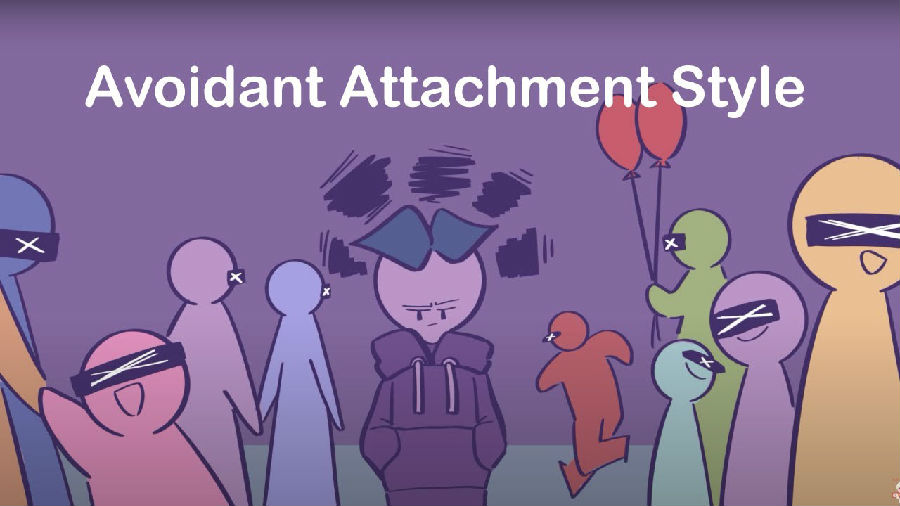Hey, Psych2goers! Welcome back to another video. Before we start, we'd like to give you a huge thanks for all the love and support that you've given us.
各位观众,欢迎回来。在开始今天的节目前,我们想感谢大家给我们的爱和支持。
Psych2Go's mission is to make psychology and mental health more accessible to everyone. Now, let's begin the video.
Psych2Go的目标是制作人人都能接触的心理学和心理健康知识。现在开始吧。
Attachment theory describes the different ways people can act in relationships.
依恋理论描述的是在一段恋情中人们不同的行为方式。
When someone has an avoidant attachment style, they're uncomfortable with growing emotionally bonded or close to someone else.
当某人拥有回避型依恋人格时,他们会对与他人不断增长的情感关联感到不适。
It can actually be broken down into two subcategories: Dismissive Avoidant and Fearful Avoidant.
这其实可以分成两小类:疏离型回避以及恐惧型回避。
This kind of attachment theory usually carries on through adulthood and can affect relationships of all types.
这种依恋理论通常会贯穿整个成年期,并且会影响到所有类型的关系。
Wondering if avoidant attachment applies to you or a loved one? Here are eight signs of an avoidant attachment style.
想知道自己或爱的人是不是回避型依恋人格?以下是回避型依恋人格的8种迹象。
1. You were emotionally neglected in your childhood.
1. 童年的你在情感上遭到忽视。
Do you feel safer keeping your intense emotions to yourself?
你觉得把自己的强烈情感藏起来更安全吗?
Childhood neglect can be traumatic and often develops into an avoidant attachment style.
童年被忽视会造成创伤,且经常会发展成回避型依恋人格。
According to Healthline, some parents might discourage their child from outwardly expressing both positive and negative emotions.
根据《健康线》,一些父母可能会阻止他们的孩子外向地表达积极和消极的情绪。
These parents may have ignored the needs of their child when they were emotionally vulnerable.
这些父母可能在孩子情感脆弱时忽视了他们的需求。
This is the sign of avoidant attachment because it conditions children to not only fend for themselves
这是回避依恋的标志,因为它使孩子们不仅要照顾自己,
but also to hide their emotions and vulnerabilities from others.
还要向别人隐藏自己的情感和弱点。
2. You tend to suppress your emotions.
2. 你倾向于压抑自己的情绪。
Were you taught to view emotional expressions as a weakness?
你是否被教导将情感表达视为一种弱点?
Do you find that you're better off dealing with things internally?
你是否发现内部消化这些事情会更好?
Do you tend to bottle your emotions and internally punish yourself for being vulnerable?
你是否倾向于压抑自己的情绪,并因为自己的脆弱而在内心惩罚自己?
People with avoidant attachment are uncomfortable disclosing their vulnerabilities
回避依恋人格的人不愿意暴露自己的弱点,
and they may look down on people who are more emotionally vulnerable than themselves.
他们可能会轻视那些情感比他们脆弱的人。
3. You have trouble dealing with emotional intimacy.
3. 你在处理情感亲密方面有困难。
Do you have difficulty with emotional expression in relationships?
你在感情表达方面有困难吗?
Do you keep conversations on a comfortable surface level or take extended periods of me-time?
你是让谈话维持在一个舒适的表面水平还是延长自我时间?
When you have an avoidant attachment style, you shy away from emotional closeness, afraid to reveal too much about yourself.
当你拥有回避型依恋人格时,你害怕感情上的亲密,害怕透露太多关于自己的信息。
You struggle with not wanting to need others for anything.
你挣扎着不需要别人做任何事。

In relationships, this emotional distance can make other people confused, angry and they might even take it personally.
在一段关系中,这种情感距离可以让其他人感到困惑、愤怒,甚至会把这当成针对自己的事情。
But the truth is it's actually a defense mechanism for you for you have extreme boundaries.
但实际上,这其实是你的一种防御机制,因为你有极端的边界。
4. You have extreme boundaries.
4. 你有极端的界限。
Do you have very specific, firm and strict boundaries?
你拥有非常明确、坚定且严格的边界?
This can go as far as restricting the amount of time you spend with others or refusing to share about certain parts of your life.
这种边界可以是限制你与他人相处的时间,或者拒绝分享你生活的某些部分。
We do want to emphasize that there is absolutely nothing wrong with boundaries.
我们要强调的是,边界绝对没有错。
Having healthy boundaries is essential in maintaining healthy relationships.
拥有健康的边界在维持健康关系中是很有必要的。
However, people who have excessive boundaries may appear distant or closed off.
但极端边界可能会让人显得疏远或封闭。
5. You have shallow relationships.
5. 关系肤浅。
Do you like to keep relationships at a shallow level whether it be romantic or platonic?
你喜欢保持一种肤浅的关系,无论是浪漫的还是柏拉图式的吗?
In a romantic relationship, you may refuse to meet your partner's family
在一种浪漫关系中,你可能会拒绝和你伴侣的家人见面
or avoid topics and situations that would turn the relationship into a more serious one.
或避免深入你们关系的话题和情况。
In a platonic relationship, you may refuse to go into emotional depth about yourself
而在柏拉图式关系中,你可能会拒绝深入自己的情感
or have long conversations or see others that often.
或者拒绝经常与他人进行长时间的交谈或见面。
6. Strong independence.
6. 强烈的独立性。
Are you extremely independent and self-focused? Did you have to fend for yourself at an early age?
你是否非常独立,以自我为中心?你在很小的时候就必须自己照顾自己吗?
Do you secretly look down on people who depend on others? Independence by itself, isn't a bad thing.
你会偷地看不起那些依赖别人的人吗?独立本身不是什么坏事。
As children grow, they should be increasingly more comfortable with making decisions on their own.
随着孩子的成长,他们应该越来越适应自己做决定。
However, when children are forced to become independent too early due to neglect,
但当孩子们因为被忽视而被迫过早独立,
they may develop a strong need to always solve problems on their own, rather than having developed a healthy level of self-sufficiency.
他们可能会形成一种总是要自己解决问题的强烈需求,而不是形成一种自给自足的健康水平。
7. You have trust issues.
7. 你有信任问题。
Did you get the proper attention and care you deserved as a child?
孩子时期的你获得了应有的注意和关照了么?
If not, it's logical that you'd have a hard time trusting others throughout your life.
如果没有, 你一生中难以信任别人也是有道理的。
Even in adulthood, you struggle to trust even in those closest to you
即使在童年时期,你甚至都难以信任最亲近的人
and will try to distance yourself from wanting or receiving affection from others.
并且你试着远离自己想要或接受他人的喜爱。
And 8. You're critical, on yourself and others.
8. 你对自己和其他很挑剔。
When you have the avoidant attachment style, you may often find faults in those around you
当你拥有回避型依恋人格,你可能通常挑周围人的错,
and this is more associated with a dismissive-avoidant attachment style.
并且和疏离型回避更相关。
According to Joyce Catlett M.A. from Psychalive, the trauma that most commonly associated with this attachment style
根据Psychalive的Joyce Catlett M.A.,和这种依恋人格最普遍相关的创伤
empowers the minds' inner critical voice so much that it actually overshadows their inner positive voice.
增长了心灵的内在批判性声音,以至于它实际上掩盖了内在的积极声音。
As a result, it's easier for you to identify faults within yourself and others compared to the positive qualities.
因此,与积极的品质相比,你更容易发现自己和他人的缺点。
We hope you enjoyed learning about the signs of avoidant attachment style.
我们希望大家喜欢学习回避型依恋人格的迹象。
Did you recognize any of these signs in yourself or any of your loved ones?
你在自己或你所爱的人身上发现过这些迹象吗?
If you found this video helpful, be sure to like and share it with those you think might benefit from it.
如果你觉得本期视频有用,请点赞并和需要的人分享。
Don't forget to hit the subscribe button for more Psych2Go content,
不要忘记点击订阅按钮,观看更多内容,
and the references and studies used in this video are added in the description below. Thanks for watching and we'll see you soon.
本期视频中使用到的参考文献和研究已添加至下方描述框。感谢收看,下期见。













